A Study of Oceanic Reverberation Modeling Based on a Nonlinear Low-Dimensional Dynamic System
关于海底研究的英语作文

关于海底研究的英语作文Deep-Sea Research。
The ocean covers more than 70% of the Earth's surface, and yet we have only explored a small fraction of it. The vast majority of the ocean is deep and dark, with crushing pressures and frigid temperatures that make it inhospitable to most forms of life. Nevertheless, scientists are increasingly turning their attention to the deep sea, drawn by the prospect of discovering new species, unlocking the secrets of the ocean's past, and understanding the impactof human activities on this vast and fragile ecosystem.One of the most important tools for deep-sea researchis the remotely operated vehicle (ROV). These are unmanned submersibles that can be controlled from the surface, allowing scientists to explore the ocean floor without risking human lives. ROVs are equipped with cameras, lights, and sensors that can collect data on everything from the temperature and salinity of the water to the behavior ofdeep-sea creatures. They can also collect samples of rocks, sediments, and organisms for analysis back on shore.One of the most exciting recent discoveries in deep-sea research was the existence of hydrothermal vents. These are cracks in the ocean floor where hot, mineral-rich water spews out from the Earth's crust. These vents support a unique ecosystem of organisms that thrive in the extreme conditions, including giant tube worms, crabs, and shrimp that are found nowhere else on Earth. Hydrothermal vents are also of great interest to scientists because they may provide clues to the origins of life on Earth and the possibility of life on other planets.Deep-sea research is not without its challenges, however. The extreme depth and pressure of the ocean floor make it difficult and expensive to explore, and thedelicate ecosystem is vulnerable to damage from human activities such as mining and oil drilling. Nevertheless, scientists are committed to studying this important and fascinating part of our planet, and to using their findings to help protect and preserve the ocean for futuregenerations.In conclusion, deep-sea research is a vital and exciting field that has the potential to unlock many mysteries of the ocean. With the help of advanced technology and the dedication of scientists around the world, we can continue to explore and understand this vast and complex ecosystem, and work to protect it for generations to come.。
海洋探索比太空探索更重要的英语作文

海洋探索比太空探索更重要的英语作文In the realm of scientific discovery and exploration, two fronts have always captured the imagination of mankind: the vastness of space and the depths of the ocean. While both offer an endless supply of mysteries and potential for knowledge acquisition, the significance of marineexploration surpasses space exploration for several reasons. Firstly, the ocean covers a much larger area than space does for human exploration. The Earth's surface is approximately 71% water, compared to the vastness of space which, despite being infinite, is still relatively unexplored due to technological and financial constraints. The ocean, with its diverse ecosystems and potential resources, remains a largely uncharted frontier, offeringan abundance of scientific and economic opportunities.Secondly, the ocean plays a crucial role in regulating the global climate and environment. Ocean currents andwater temperatures affect weather patterns and climate change, while marine biodiversity supports ecosystems that are vital for human survival. By exploring andunderstanding the ocean, we can gain insights into how tomitigate the impact of climate change and protect ourplanet's delicate ecological balance.Moreover, the ocean holds the key to understanding our own evolutionary history. Fossils and genetic materialfound in marine sediments provide valuable clues about the origin and development of life on Earth. By studying the ocean, we can gain a deeper understanding of our own biological and cultural heritage.Additionally, marine exploration has the potential to lead to significant technological advancements. The development of underwater robots, remote sensing equipment, and sustainable energy sources for ocean exploration have the potential to revolutionize not only our understandingof the ocean but also other fields such as medicine, engineering, and renewable energy.Lastly, the ocean's resources, including fish stocks, minerals, and renewable energy such as wave and tidal power, offer the potential for sustainable economic growth. By exploring and responsibly harnessing these resources, wecan ensure a more sustainable future for ourselves andfuture generations.In conclusion, while space exploration is undoubtedly important for understanding the universe and our placewithin it, the significance of marine exploration surpasses it in terms of its impact on our planet, our environment, and our future. The ocean holds the key to unlocking the mysteries of life, climate change, and sustainable development, making it a crucial focus for scientific exploration and research.**海洋探索比太空探索更重要的意义**在科学发现和探索的领域中,两个领域一直激发着人类的想象力:广阔的太空和深邃的海洋。
有关海洋探索的英语小作文高中
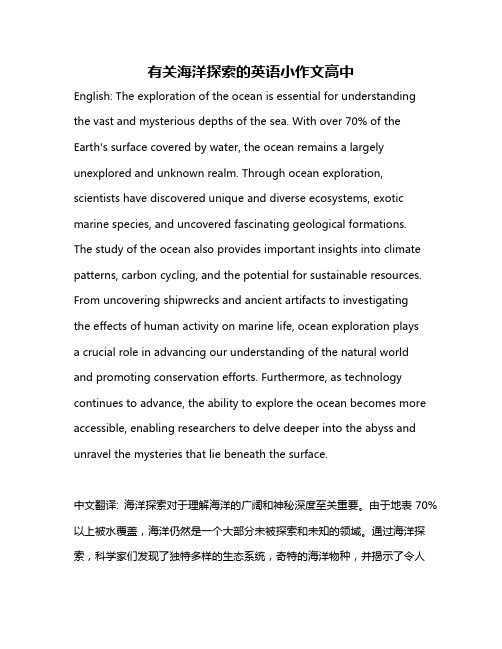
有关海洋探索的英语小作文高中English: The exploration of the ocean is essential for understanding the vast and mysterious depths of the sea. With over 70% of the Earth's surface covered by water, the ocean remains a largely unexplored and unknown realm. Through ocean exploration, scientists have discovered unique and diverse ecosystems, exotic marine species, and uncovered fascinating geological formations. The study of the ocean also provides important insights into climate patterns, carbon cycling, and the potential for sustainable resources. From uncovering shipwrecks and ancient artifacts to investigatingthe effects of human activity on marine life, ocean exploration playsa crucial role in advancing our understanding of the natural world and promoting conservation efforts. Furthermore, as technology continues to advance, the ability to explore the ocean becomes more accessible, enabling researchers to delve deeper into the abyss and unravel the mysteries that lie beneath the surface.中文翻译: 海洋探索对于理解海洋的广阔和神秘深度至关重要。
研究海洋生物有什么好处作文英语
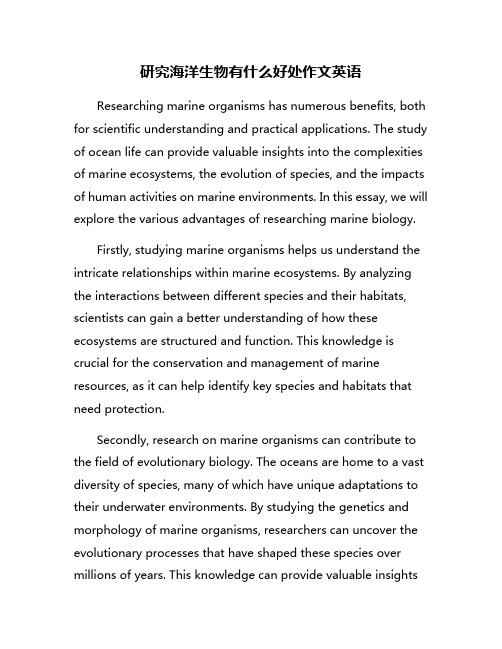
研究海洋生物有什么好处作文英语Researching marine organisms has numerous benefits, both for scientific understanding and practical applications. The study of ocean life can provide valuable insights into the complexities of marine ecosystems, the evolution of species, and the impacts of human activities on marine environments. In this essay, we will explore the various advantages of researching marine biology.Firstly, studying marine organisms helps us understand the intricate relationships within marine ecosystems. By analyzing the interactions between different species and their habitats, scientists can gain a better understanding of how these ecosystems are structured and function. This knowledge is crucial for the conservation and management of marine resources, as it can help identify key species and habitats that need protection.Secondly, research on marine organisms can contribute to the field of evolutionary biology. The oceans are home to a vast diversity of species, many of which have unique adaptations to their underwater environments. By studying the genetics and morphology of marine organisms, researchers can uncover the evolutionary processes that have shaped these species over millions of years. This knowledge can provide valuable insightsinto the origins of life on Earth and how species have evolved and diversified over time.Furthermore, studying marine organisms can have practical applications in areas such as medicine, biotechnology, and environmental conservation. Many marine organisms produce bioactive compounds that have potential pharmaceutical properties, such as anti-cancer, anti-inflammatory, and antimicrobial effects. By studying these organisms and their chemical compounds, scientists can develop new drugs and treatments for various diseases. For example, the discovery of the antifungal compound griseofulvin from a marine fungus has led to the development of effective treatments for fungal infections in humans.In addition, marine organisms are a rich source of genetic diversity that can be harnessed for biotechnological applications. Marine biotechnology research has led to the development of new techniques for aquaculture, bioremediation, and environmental monitoring. For example, genetic engineering of marine algae has been used to produce biofuels and bioplastics, which can help reduce our reliance on fossil fuels and plastics derived from petroleum.Moreover, studying marine organisms can help us better understand the impacts of human activities on marine environments and how we can mitigate these effects. Climate change, pollution, overfishing, and habitat destruction are major threats to marine ecosystems, and research on marine organisms can provide valuable information on how these threats are affecting marine life. By studying the responses of marine organisms to environmental stressors, scientists can develop strategies for sustainable management and conservation of marine resources.In conclusion, research on marine organisms has numerous benefits for scientific understanding, medical advancements, biotechnological innovations, and environmental conservation. By studying the diverse and fascinating life forms in our oceans, we can gain valuable insights into the complexities of marine ecosystems, the evolution of species, and the impacts of human activities on marine environments. Therefore, it is essential to continue exploring and researching the wonders of marine biology for the betterment of our planet and future generations.。
为什么要研究深海的英语作文
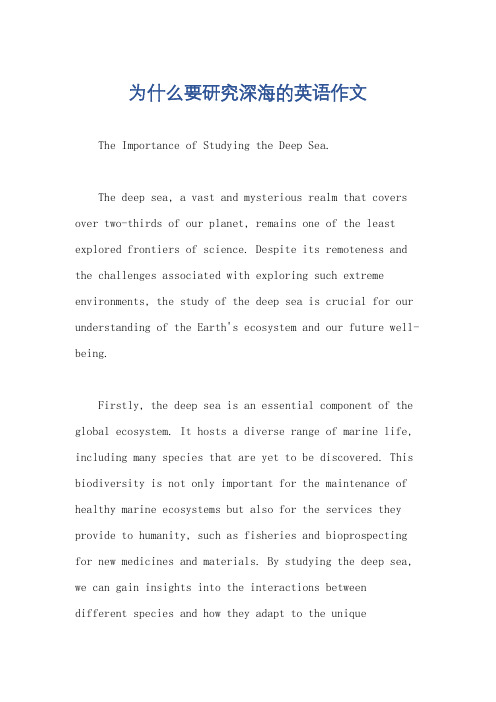
为什么要研究深海的英语作文The Importance of Studying the Deep Sea.The deep sea, a vast and mysterious realm that covers over two-thirds of our planet, remains one of the least explored frontiers of science. Despite its remoteness and the challenges associated with exploring such extreme environments, the study of the deep sea is crucial for our understanding of the Earth's ecosystem and our future well-being.Firstly, the deep sea is an essential component of the global ecosystem. It hosts a diverse range of marine life, including many species that are yet to be discovered. This biodiversity is not only important for the maintenance of healthy marine ecosystems but also for the services they provide to humanity, such as fisheries and bioprospecting for new medicines and materials. By studying the deep sea, we can gain insights into the interactions between different species and how they adapt to the uniquechallenges of these environments.Secondly, the deep sea plays a crucial role in global climate regulation. The oceans absorb and store a significant amount of heat and carbon dioxide, helping to mitigate the effects of climate change. However, changes in oceanic conditions, such as acidification due to increasing carbon dioxide levels, can have profound impacts on deep-sea ecosystems. Studying the deep sea can help us understand how these ecosystems are responding to climate change and what the potential consequences might be for the global climate system.Moreover, the deep sea holds vast resources that could be key to our future sustainability. For instance, deep-sea minerals such as manganese nodules and polymetallicsulfides are rich in critical metals and elements that are essential for modern technology and renewable energy production. However, the exploitation of these resources must be carefully managed to avoid irreversible damage to the environment. Research into the deep sea can help us develop sustainable extraction methods and ensure that weharness these resources in a way that benefits both the environment and society.Additionally, studying the deep sea can provideinsights into the Earth's geological history. The deep-sea floor is covered in sediments that have accumulated over millions of years, preserving a record of Earth's climate, ocean circulation, and tectonic activity. By analyzing these sediments, scientists can reconstruct past environmental conditions and understand how the Earth's climate system has responded to natural and anthropogenic forcings in the past. This knowledge is crucial for predicting how our planet might respond to future climate change.In conclusion, the study of the deep sea is fundamental to our understanding of the Earth's ecosystem, climate system, and geological history. It holds the key to unlocking the mysteries of life in extreme environments, the potential for new resources and technologies, and insights into the past that can inform our response to the challenges of the future. As we continue to explore andunderstand the deep sea, we must do so with respect and responsibility, ensuring that our scientific pursuits do not come at the cost of irreversible environmental damage.。
支持海洋探险辩论赛的建议英文作文高中

支持海洋探险辩论赛的建议英文作文高中精选英文支持海洋探险辩论赛的建议英文作文高中:Title: Embracing the Unknown: A Strong Argument for Ocean ExplorationOcean exploration, a journey into the vast and mysterious depths of our blue planet, is not only a thrilling adventure but a crucial endeavor for humanity's future. This debate is often fraught with arguments about cost, risk, and potential benefits, but I firmly stand on the side of supporting ocean exploration.Firstly, the scientific benefits of ocean exploration are immense. The ocean covers over 70% of our planet's surface, yet we have only scratched the surface of its secrets. Every new discovery, whether it's a previously unknown species or a geological phenomenon, contributes to our understanding of the Earth and life itself. This knowledge can lead to advancements in fields like medicine, technology, and even climate science.Moreover, ocean resources are vast and untapped. From minerals and rare earth elements to biological compounds with potential medicinal uses, the ocean holds a treasure trove of resources that could greatly benefit human civilization. While extracting these resources responsibly is crucial, the potential benefits outweigh the risks.Furthermore, ocean exploration promotes international cooperation and understanding. As nations work together to explore and study the ocean, they build bridges of understanding and cooperation that can spill over into other areas of international relations. This unity in the face of the unknown can foster a sense of global community and shared responsibility for our planet.Admittedly, ocean exploration comes with inherent risks and costs. Deep-sea missions are expensive, and the environment is harsh and unforgiving. However, these challenges should not dissuade us from pursuing this important endeavor. With advancements in technology and careful planning, we can mitigate these risks and maximize the benefits of ocean exploration.In conclusion, ocean exploration is not just an exciting adventure but a necessary step in our understanding and preservation of the planet. It offers scientific benefits, untapped resources, and opportunities for international cooperation. While the journey may be fraught with challenges, the potential rewards are worth the effort. Let us embrace the unknown and forge ahead into the depths of the ocean, for the sake of knowledge, progress, and the future of humanity.中文对照翻译:标题:拥抱未知:海洋探索的有力论据海洋探索,一次进入我们蓝色星球广阔而神秘深处的旅程,不仅是一次激动人心的冒险,也是人类未来的一次重要努力。
海洋研究的重要性英语作文简单句
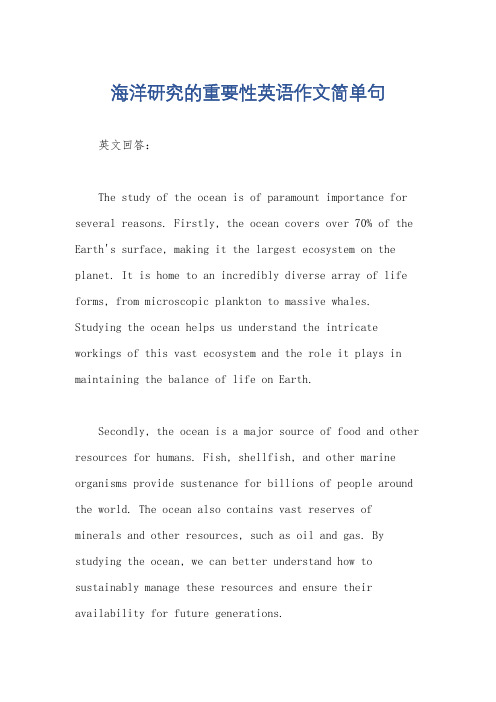
海洋研究的重要性英语作文简单句英文回答:The study of the ocean is of paramount importance for several reasons. Firstly, the ocean covers over 70% of the Earth's surface, making it the largest ecosystem on the planet. It is home to an incredibly diverse array of life forms, from microscopic plankton to massive whales. Studying the ocean helps us understand the intricate workings of this vast ecosystem and the role it plays in maintaining the balance of life on Earth.Secondly, the ocean is a major source of food and other resources for humans. Fish, shellfish, and other marine organisms provide sustenance for billions of people around the world. The ocean also contains vast reserves of minerals and other resources, such as oil and gas. By studying the ocean, we can better understand how to sustainably manage these resources and ensure their availability for future generations.Thirdly, the ocean plays a crucial role in regulating the Earth's climate. The ocean absorbs carbon dioxide from the atmosphere, helping to mitigate the effects of climate change. It also regulates the Earth's temperature by absorbing and releasing heat. Studying the ocean helps us understand how these processes work and how they may be affected by human activities.Finally, the ocean is a source of beauty and wonder.Its vast expanse, teeming with life, has inspired awe and admiration in humans for centuries. Studying the ocean helps us appreciate its beauty and value, and encourages us to protect and preserve this precious resource.中文回答:海洋研究的重要性。
海洋探索两面性的英语作文

海洋探索两面性的英语作文The Dual Nature of Ocean ExplorationThe vast expanse of the world's oceans has long captivated the human imagination, drawing explorers, scientists, and adventurers alike to uncover its mysteries. From the depths of the Mariana Trench to the vibrant coral reefs teeming with life, the ocean presents a realm of both wonder and challenge. As we delve deeper into the exploration of this aquatic domain, we find ourselves confronted with the dual nature of this endeavor – a delicate balance between the potential benefits and the inherent risks that come with uncovering the secrets of the deep.On one hand, the pursuit of ocean exploration has yielded remarkable scientific discoveries that have expanded our understanding of the natural world and our place within it. The exploration of the ocean floor has revealed a wealth of geological and biological information, shedding light on the formation of the Earth, the evolution of marine life, and the complex interplay of oceanic currents and climate patterns. The development of advanced technologies, such as remotely operated vehicles (ROVs) and autonomous underwater vehicles (AUVs), has enabled scientists toventure into previously inaccessible regions, gathering data and samples that have revolutionized our knowledge of the marine ecosystem.Moreover, the exploration of the oceans has also led to the development of new technologies and industries that have the potential to improve the quality of human life. The search for renewable energy sources has driven the exploration of offshore wind and wave power, offering promising alternatives to fossil fuels and contributing to the global effort to mitigate the effects of climate change. The discovery of rare minerals and valuable resources on the ocean floor has also sparked interest in deep-sea mining, which could potentially provide new sources of raw materials to meet the growing demands of a rapidly industrializing world.However, the dual nature of ocean exploration also presents significant challenges and risks that must be carefully considered. The delicate balance of the marine ecosystem is particularly vulnerable to the impact of human activities, and the exploration of the oceans can have far-reaching consequences on the fragile habitats and the species that call them home. The disturbance of the seafloor, the introduction of pollutants, and the disruption of migratory patterns can all have devastating effects on the intricate web of life that exists beneath the waves.Furthermore, the exploration of the deep sea also carries inherent risks to the safety and well-being of the explorers themselves. The immense pressures, extreme temperatures, and limited visibility of the ocean depths pose significant challenges to the design and operation of exploration equipment, and even the most advanced technologies can be vulnerable to mechanical failure or unexpected environmental conditions. The loss of human life in the pursuit of ocean exploration is a sobering reminder of the inherent dangers that come with venturing into this unforgiving realm.As we continue to push the boundaries of our understanding of the oceans, it is crucial that we strike a careful balance between the potential benefits and the potential risks. This requires a comprehensive and multidisciplinary approach to ocean exploration, one that prioritizes scientific rigor, environmental stewardship, and the safety and well-being of the explorers. It is essential that we develop robust regulatory frameworks and international collaborations to ensure that the exploration of the oceans is conducted in a responsible and sustainable manner, minimizing the impact on the marine environment and safeguarding the lives of those who dare to venture into the unknown.The dual nature of ocean exploration is a testament to the complexity and the wonder of the aquatic world. On one hand, it offers the promise of groundbreaking scientific discoveries,technological advancements, and the potential to address some of the most pressing challenges facing humanity. On the other hand, it presents a daunting array of risks and challenges that must be carefully navigated. As we continue to explore the depths of the oceans, it is our responsibility to do so with a deep respect for the fragility of the marine ecosystem and a steadfast commitment to the safety and well-being of all those who embark on this incredible journey of discovery.。
海洋研究比太空研究更重要英语作文

海洋研究比太空研究更重要英语作文英文回答:Ocean research is more important than space researchfor several reasons. First of all, the ocean covers more than 70% of the Earth's surface and plays a crucial role in regulating the planet's climate. Understanding the ocean is essential for predicting weather patterns, studying climate change, and preserving marine ecosystems.Secondly, the ocean is a vast source of resources that are essential for human survival. It provides food, energy, and minerals that support industries and economies around the world. By studying the ocean, we can better manage these resources and ensure their sustainable use for future generations.Furthermore, the ocean is home to a wide variety of marine life, many of which are still undiscovered. Studying the ocean allows us to learn more about these species andtheir habitats, which can help us protect and conserve biodiversity.In contrast, while space research is important for exploring the universe and understanding our place in it, the ocean is more immediate and directly impacts our daily lives. For example, ocean research can help us better understand and prepare for natural disasters likehurricanes and tsunamis, which can have devastating effects on coastal communities.In conclusion, ocean research is more important than space research because of its impact on the Earth's climate, its vital resources, and its diverse ecosystems. Bystudying the ocean, we can better protect and sustain our planet for future generations.中文回答:海洋研究比太空研究更重要,原因有几个。
深海探索好处英语作文

深海探索好处英语作文Exploring the deep sea offers numerous benefits, ranging from scientific discoveries to technological advancements and environmental conservation. Let's delve into these advantages in detail.Firstly, deep-sea exploration contributes significantly to scientific knowledge. The ocean floor holds a wealth of undiscovered species, unique ecosystems, and geological formations. By studying these environments, scientists gain insights into biodiversity, evolutionary processes, and the intricate relationships between organisms and their habitats. Such discoveries can lead to breakthroughs in fields like marine biology, ecology, and biotechnology.Secondly, deep-sea exploration drives technological innovation. The extreme conditions of the deep ocean—high pressure, darkness, and cold temperatures—challenge engineers and researchers to develop specialized equipment and vehicles capable of withstanding these harshenvironments. Technologies such as remotely operatedvehicles (ROVs), autonomous underwater vehicles (AUVs), and advanced sensing instruments are continuously refined and enhanced through deep-sea exploration efforts. These innovations not only benefit ocean exploration but alsofind applications in other industries, such as offshore energy, deep-sea mining, and underwater infrastructure development.Furthermore, deep-sea exploration plays a crucial rolein understanding climate change and its impact on marine ecosystems. The deep ocean acts as a carbon sink, absorbing and storing vast amounts of carbon dioxide from the atmosphere. By studying deep-sea processes like carbon sequestration, ocean circulation patterns, and thermal vent activity, scientists can improve climate models and predictions. Additionally, deep-sea research helps assess the effects of human activities, such as pollution and overfishing, on deep-sea biodiversity and ecosystem health.Moreover, deep-sea exploration holds economic potential. Beyond its ecological and scientific significance, the deepocean harbors valuable resources like minerals, hydrocarbons, and genetic materials. As traditional terrestrial resources become increasingly scarce, interest in deep-sea mining and bioprospecting grows. However, responsible exploration and management strategies are essential to minimize environmental impacts and ensure sustainable resource extraction.Lastly, deep-sea exploration inspires curiosity, education, and public engagement. Discoveries from the depths captivate the imagination of people worldwide, sparking interest in marine science and conservation. Educational outreach programs, documentaries, and exhibitions about deep-sea exploration raise awareness about the importance of ocean conservation and the need to protect these fragile ecosystems.In conclusion, deep-sea exploration offers a multitude of benefits, from expanding scientific knowledge and driving technological innovation to aiding environmental conservation and inspiring public interest. By continuing to explore and understand the mysteries of the deep ocean,we can unlock its potential for the betterment of humanity while preserving its delicate balance for future generations.。
海底探索英语作文800字科学
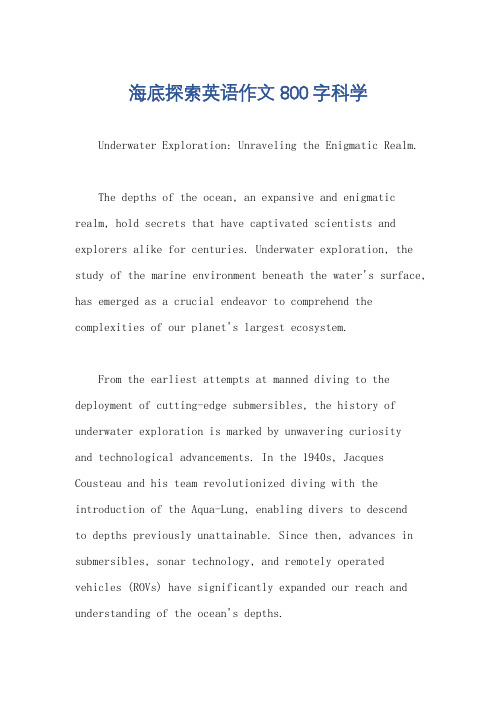
海底探索英语作文800字科学Underwater Exploration: Unraveling the Enigmatic Realm.The depths of the ocean, an expansive and enigmatic realm, hold secrets that have captivated scientists and explorers alike for centuries. Underwater exploration, the study of the marine environment beneath the water's surface, has emerged as a crucial endeavor to comprehend the complexities of our planet's largest ecosystem.From the earliest attempts at manned diving to the deployment of cutting-edge submersibles, the history of underwater exploration is marked by unwavering curiosityand technological advancements. In the 1940s, Jacques Cousteau and his team revolutionized diving with the introduction of the Aqua-Lung, enabling divers to descendto depths previously unattainable. Since then, advances in submersibles, sonar technology, and remotely operated vehicles (ROVs) have significantly expanded our reach and understanding of the ocean's depths.The scientific importance of underwater explorationlies in its potential to unveil the mysteries of marine life, geology, and oceanography. Scientists utilize submersibles and ROVs to conduct detailed observations, collect samples, and conduct experiments in situ. These investigations have yielded unprecedented insights into the wide array of marine organisms, their interactions, and the mechanisms that govern the functioning of the marine ecosystem.Among the remarkable discoveries made through underwater exploration are the vast hydrothermal vent systems found along the mid-ocean ridges. These underwater hot springs support thriving communities of unique organisms that have adapted to the extreme conditions of superheated water and high sulfur concentrations. The vents provide insights into the origins of life on Earth and the potential for extraterrestrial life.Furthermore, underwater exploration has shed light on the role of the ocean in climate regulation. The oceanabsorbs heat and carbon dioxide from the atmosphere, mitigating the impacts of climate change. By studying the ocean's carbon sinks, scientists can better predict future climate scenarios and develop strategies for sustainable ocean use.Beyond scientific discoveries, underwater exploration has practical implications for industries such as fisheries, aquaculture, and marine resource management. By mapping the seafloor and studying fish populations, scientists canguide policymakers in implementing sustainable fishing practices and protecting marine ecosystems. Moreover, underwater exploration has led to the development of technologies that are applied in various fields, including underwater construction and telecommunications.However, the vastness and inaccessibility of the ocean present challenges to underwater exploration. Limited visibility, extreme pressures, and the potential for unforeseen hazards demand meticulous planning,sophisticated equipment, and highly skilled personnel. The safety of divers and submersibles is paramount, andrigorous protocols are implemented to minimize risks.Environmental concerns also play a significant role in underwater exploration. The use of submersibles and ROVs must be carefully managed to minimize disturbance to marine life and ecosystems. Scientists adhere to ethical guidelines to ensure that their research activities do not harm the environment.As we continue to navigate the enigmatic depths, underwater exploration holds immense promise for advancing our scientific understanding and unlocking the potential of the marine realm. By embracing technological innovation, prioritizing safety, and respecting the environment, we can unravel the secrets of the ocean and harness its resources for the benefit of humanity and the planet.。
未来海底潜水艇英语作文
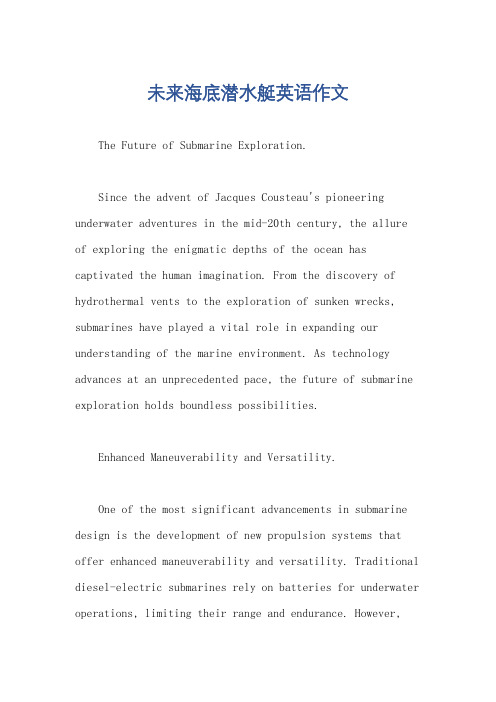
未来海底潜水艇英语作文The Future of Submarine Exploration.Since the advent of Jacques Cousteau's pioneering underwater adventures in the mid-20th century, the allure of exploring the enigmatic depths of the ocean has captivated the human imagination. From the discovery of hydrothermal vents to the exploration of sunken wrecks, submarines have played a vital role in expanding our understanding of the marine environment. As technology advances at an unprecedented pace, the future of submarine exploration holds boundless possibilities.Enhanced Maneuverability and Versatility.One of the most significant advancements in submarine design is the development of new propulsion systems that offer enhanced maneuverability and versatility. Traditional diesel-electric submarines rely on batteries for underwater operations, limiting their range and endurance. However,the advent of fuel cell technology and nuclear propulsion has revolutionized submarine capabilities. Fuel cells provide a clean and efficient source of power, allowing submarines to remain submerged for extended periods, while nuclear reactors offer virtually unlimited endurance.In addition to improved propulsion, advancements in sensor technology have significantly enhanced submarines' ability to navigate complex underwater environments. Multi-beam sonars and laser scanners create detailed maps of the surrounding terrain, enabling submarines to operate safely in areas with limited visibility. High-resolution cameras and advanced image processing algorithms allow for precise underwater observations, facilitating the study of marine life and the identification of potential hazards.Autonomous and Remotely Operated Submarines.The future of submarine exploration also lies in the development of autonomous and remotely operated submarines. These uncrewed vehicles can be deployed for long-duration missions in extreme environments, overcoming thelimitations of human endurance and safety. Autonomous submarines are equipped with advanced navigation andcontrol systems that enable them to operate independently, while remotely operated submarines are controlled by operators on the surface.Autonomous submarines are particularly well-suited for long-term monitoring and data collection. They can be programmed to conduct repeated surveys, track environmental changes, and collect valuable scientific data without human intervention. Remotely operated submarines, on the other hand, offer real-time control and the ability to respond quickly to unexpected situations. They are ideal for conducting detailed inspections, performing underwater repairs, and conducting search and rescue operations.Exploration of Extreme Environments.With enhanced capabilities and autonomous capabilities, submarines are poised to explore previously inaccessible regions of the ocean. The deep sea, characterized by crushing pressures and extreme temperatures, holds manymysteries yet to be uncovered. Advancements in materials science and engineering are enabling the development of submarines that can withstand the harsh conditions of the abyss, opening up new frontiers for scientific exploration.Another promising area of exploration is the polar regions. Submarines equipped with ice-breaking capabilities can navigate through thick ice sheets, providing access to the pristine and unexplored waters beneath. These regions offer unique insights into climate change, marine ecosystems, and the impact of human activities on the polar environment.Scientific and Commercial Applications.Submarine exploration has far-reaching scientific and commercial applications. By studying the marine environment, scientists can gain a deeper understanding of climate change, ocean currents, and marine ecosystems. Submarines can also be used for geological surveys, mineral exploration, and the development of offshore infrastructure.The commercial applications of submarine technology extend beyond scientific research. Underwater robotics, developed for submarine operations, has found use in various industries, including oil and gas exploration, construction, and underwater maintenance. Submarines are also increasingly used for tourism and recreation, allowing individuals to experience the wonders of the underwater world firsthand.Conclusion.The future of submarine exploration is brimming with excitement and possibilities. As technology continues to advance, submarines will become increasingly capable, versatile, and autonomous. They will pave the way for unprecedented exploration of extreme environments, unlocking the secrets of the deep sea and polar regions. The scientific and commercial applications of submarine technology will continue to grow, providing valuable insights into the marine environment and driving innovation in various industries. The future of submarine exploration holds infinite potential to expand our knowledge of theoceans and shape our relationship with the enigmatic underwater realm.。
支持海洋探险辩论赛的建议英文作文高中
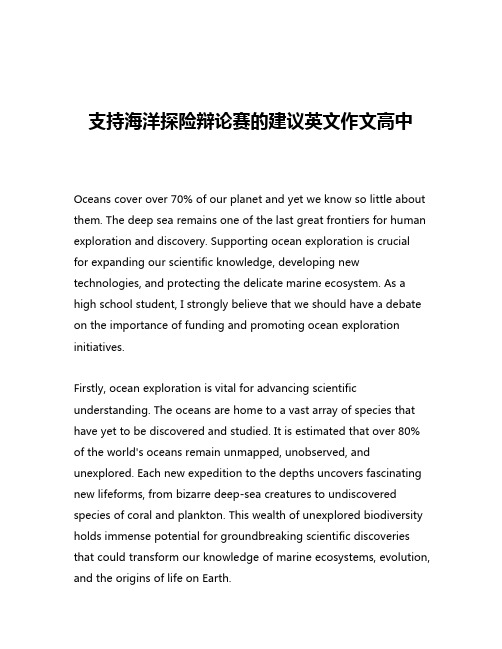
支持海洋探险辩论赛的建议英文作文高中Oceans cover over 70% of our planet and yet we know so little about them. The deep sea remains one of the last great frontiers for human exploration and discovery. Supporting ocean exploration is crucialfor expanding our scientific knowledge, developing new technologies, and protecting the delicate marine ecosystem. As a high school student, I strongly believe that we should have a debate on the importance of funding and promoting ocean exploration initiatives.Firstly, ocean exploration is vital for advancing scientific understanding. The oceans are home to a vast array of species that have yet to be discovered and studied. It is estimated that over 80% of the world's oceans remain unmapped, unobserved, and unexplored. Each new expedition to the depths uncovers fascinating new lifeforms, from bizarre deep-sea creatures to undiscovered species of coral and plankton. This wealth of unexplored biodiversity holds immense potential for groundbreaking scientific discoveries that could transform our knowledge of marine ecosystems, evolution, and the origins of life on Earth.Moreover, technological innovations stemming from ocean exploration have had a profound impact on our daily lives. Many of the technologies we rely on today, from GPS to high-speed internet, were initially developed for oceanographic research. The need to navigate, map, and communicate in the harsh underwater environment has driven the creation of game-changing technologies. For example, the development of autonomous underwater vehicles (AUVs) and remotely operated vehicles (ROVs) has revolutionized our ability to explore the deep sea. These robotic systems can reach depths inaccessible to human divers, allowing us to study previously inaccessible regions and ecosystems. Advances in fields like marine biotechnology and ocean energy also have the potential to yield new sustainable solutions to global challenges like food security and clean energy production.Beyond scientific and technological progress, ocean exploration plays a crucial role in protecting the delicate marine environment. As human activities like overfishing, pollution, and climate change continue to threaten the health of our oceans, a better understanding of marine ecosystems is essential for developing effective conservation strategies. Ocean exploration allows us to monitor the impacts of these threats and identify vulnerable or endangered species and habitats. This knowledge is crucial for guiding policymakers and conservation efforts to safeguard thelong-term sustainability of our oceans.Furthermore, ocean exploration captures the public's imagination and inspires the next generation of scientists, engineers, and explorers. The thrill of discovering new species, mapping uncharted seafloor, and pushing the boundaries of human knowledge captivates people of all ages. By investing in ocean exploration, we can spark curiosity, foster a love of science, and encourage young people to pursue careers in fields like oceanography, marine biology, and ocean engineering. This influx of talented individuals will be essential for tackling the complex challenges facing our oceans in the years to come.However, opponents of increased funding for ocean exploration may argue that the costs are too high, and that limited resources should be directed towards more pressing societal issues. They may contend that the potential scientific and technological benefits do not justify the substantial financial investment required for deep-sea expeditions and the development of specialized exploration equipment.While these concerns are understandable, I would argue that the long-term dividends of ocean exploration far outweigh the upfront costs. The knowledge and innovations generated by these initiatives have the potential to address a wide range of global challenges, fromfood security and renewable energy to climate change mitigation and biodiversity conservation. Moreover, the inspiration and educational value of ocean exploration should not be underestimated. By capturing the public's imagination and nurturing the next generation of ocean stewards, we can ensure the sustainable management of our marine resources for generations to come.In conclusion, a high school debate on supporting ocean exploration would be a valuable exercise in exploring the multifaceted benefits of this critical field of research and discovery. From advancing scientific understanding to driving technological innovation and protecting the marine environment, the case for increased investment in ocean exploration is a compelling one. By fostering a deeper appreciation for the wonders of the underwater world, we can empower young people to become the bold explorers, innovative thinkers, and passionate advocates needed to safeguard the health of our oceans for the future.。
当个小小海洋学家英语作文

当个小小海洋学家英语作文英文回答:As a budding marine biologist, my thirst for knowledge about the vast and enigmatic ocean depths consumes me. I am driven by an unquenchable desire to delve into themysteries that lie beneath the waves, to unravel thesecrets of marine life, and to contribute to our understanding of this extraordinary realm.The intricate dance of marine organisms, from the smallest plankton to the colossal blue whale, fascinates me.I marvel at the diversity of life forms, each with its unique adaptations and ecological roles. The intricate interplay between organisms and their environment is a symphony of interconnectedness that I find both awe-inspiring and intellectually challenging.The ocean's vastness holds countless unanswered questions. How do deep-sea creatures withstand extremepressures and darkness? What role do microscopic organisms play in marine ecosystems? How can we mitigate the impacts of human activities on ocean health? These questions ignite my scientific curiosity and fuel my passion for discovery.Through research and exploration, I aim to contribute to the body of knowledge about marine biology. By studying the behavior, physiology, and ecology of marine organisms, I hope to gain insights into the intricate workings of the ocean ecosystem. My ultimate goal is to use my findings to develop practical solutions for ocean conservation and sustainable resource management.As a young marine biologist, I am honored to be part of the global community of scientists dedicated to understanding and protecting our oceans. I am eager to collaborate with researchers from diverse fields, share my findings, and learn from the experiences of others. Together, we can unravel the mysteries of the sea and chart a course towards a brighter future for marine ecosystems and the planet as a whole.中文回答:作为一名海洋学新手,我对广袤而神秘的海洋深处的求知欲永无止境。
我长大以后想做海洋学家50字英语作文

我长大以后想做海洋学家50字英语作文英文回答:Growing up, I have always been fascinated by the vast and mysterious realm of the ocean. The allure of exploring its hidden depths, understanding the intricate web of life beneath the waves, and uncovering the secrets that lie below the surface has captivated my imagination from a young age.As a future marine biologist, I aspire to dedicate my career to unraveling the complexities of marine ecosystems, conserving our precious marine resources, and safeguarding the health of our oceans for generations to come. I am eager to embark on expeditions to remote corners of the globe, study the behavior of marine organisms, and contribute to scientific research that advances our knowledge of the ocean's biodiversity, habitats, and ecological processes.My passion for marine science extends beyond the classroom and into the field. I have been an active volunteer at local aquariums, engaging in educational outreach programs that inspire young minds to appreciate the wonders of the underwater world. I am also certified in scuba diving, which has allowed me to witness firsthand the incredible beauty and diversity of marine life.As I pursue my academic and professional goals, I am committed to staying abreast of the latest advancements in marine biology and collaborating with fellow researchers, conservationists, and policymakers. I believe that through interdisciplinary collaboration, we can develop innovative solutions to the challenges facing our oceans and ensure a sustainable future for marine life and human communities alike.中文回答:从小,我就对海洋浩瀚而神秘的领域着迷不已。
The secrets of the ocean Ocean exploration
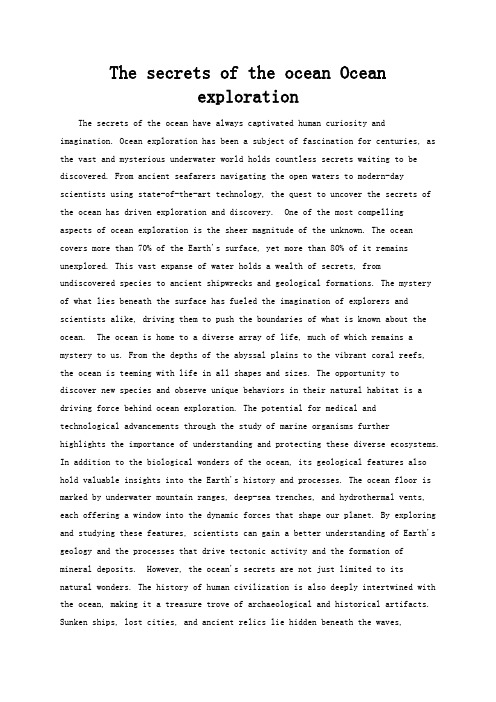
The secrets of the ocean OceanexplorationThe secrets of the ocean have always captivated human curiosity and imagination. Ocean exploration has been a subject of fascination for centuries, as the vast and mysterious underwater world holds countless secrets waiting to be discovered. From ancient seafarers navigating the open waters to modern-day scientists using state-of-the-art technology, the quest to uncover the secrets of the ocean has driven exploration and discovery. One of the most compellingaspects of ocean exploration is the sheer magnitude of the unknown. The oceancovers more than 70% of the Earth's surface, yet more than 80% of it remains unexplored. This vast expanse of water holds a wealth of secrets, fromundiscovered species to ancient shipwrecks and geological formations. The mysteryof what lies beneath the surface has fueled the imagination of explorers and scientists alike, driving them to push the boundaries of what is known about the ocean. The ocean is home to a diverse array of life, much of which remains a mystery to us. From the depths of the abyssal plains to the vibrant coral reefs,the ocean is teeming with life in all shapes and sizes. The opportunity todiscover new species and observe unique behaviors in their natural habitat is a driving force behind ocean exploration. The potential for medical andtechnological advancements through the study of marine organisms furtherhighlights the importance of understanding and protecting these diverse ecosystems. In addition to the biological wonders of the ocean, its geological features also hold valuable insights into the Earth's history and processes. The ocean floor is marked by underwater mountain ranges, deep-sea trenches, and hydrothermal vents, each offering a window into the dynamic forces that shape our planet. By exploring and studying these features, scientists can gain a better understanding of Earth's geology and the processes that drive tectonic activity and the formation ofmineral deposits. However, the ocean's secrets are not just limited to itsnatural wonders. The history of human civilization is also deeply intertwined with the ocean, making it a treasure trove of archaeological and historical artifacts. Sunken ships, lost cities, and ancient relics lie hidden beneath the waves,waiting to be discovered and studied. These underwater archaeological sites offer a unique opportunity to piece together the puzzle of human history and gain insights into past cultures and societies. Despite the allure of the ocean's secrets, exploration comes with its own set of challenges and risks. The ocean is a harsh and unforgiving environment, with extreme pressures, cold temperatures, and limited visibility posing significant obstacles to exploration. The technological advancements required to overcome these challenges, such as deep-sea submersibles and remotely operated vehicles, come with their own set oflimitations and risks. The cost and complexity of ocean exploration further compound these challenges, requiring collaboration and innovation to push the boundaries of what is possible. In conclusion, the secrets of the ocean continue to captivate and inspire explorers and scientists around the world. The vast unknown, diverse ecosystems, geological wonders, and historical artifacts make the ocean a treasure trove of discovery and potential. While the challenges of ocean exploration are significant, the rewards of uncovering the ocean's secrets are equally immense. As technology continues to advance and our understanding of the ocean deepens, the potential for new discoveries and insights into the Earth's history and future remains as boundless as the ocean itself.。
The secrets of the ocean Ocean currents

The secrets of the ocean Ocean currents The secrets of the ocean's currents are a fascinating and complex topic that has intrigued scientists and explorers for centuries. These powerful andmysterious movements of water play a crucial role in shaping the Earth's climate, marine life, and even human societies. Understanding ocean currents is essentialfor various reasons, including predicting weather patterns, navigating ships, and managing marine resources. In this response, we will delve into the secrets of ocean currents, exploring their causes, effects, and significance from multiple perspectives. From a scientific standpoint, ocean currents are primarily drivenby a combination of factors, including wind, temperature, salinity, and theEarth's rotation. The wind plays a significant role in creating surface currents, as it transfers energy to the water, causing it to move in the same direction as the wind. Additionally, temperature and salinity differences in the ocean create density variances, leading to the formation of deep-water currents through a process known as thermohaline circulation. The Earth's rotation also influencesthe direction of ocean currents through the Coriolis effect, causing water to deflect to the right in the Northern Hemisphere and to the left in the Southern Hemisphere. These intricate mechanisms result in a complex network of ocean currents that circulate around the globe, impacting various aspects of the Earth's systems. For instance, ocean currents play a crucial role in regulating theplanet's climate by redistributing heat from the equator to the poles. The warm currents carry tropical heat towards higher latitudes, moderating the climate of coastal regions and influencing weather patterns. Conversely, cold currents originating from polar regions can have a cooling effect on nearby landmasses, affecting local climates and ecosystems. Furthermore, ocean currents alsoinfluence marine life by transporting nutrients, larvae, and plankton across vast distances, shaping the distribution and abundance of species in different regions. Beyond their scientific significance, ocean currents hold immense practical importance for human societies. Historically, the study of currents has been instrumental in improving navigation and trade routes, allowing sailors to harness the power of these natural flows to reach their destinations more efficiently. Even today, an understanding of ocean currents is critical for various maritimeactivities, including shipping, fishing, and offshore resource exploration. Moreover, ocean currents can have significant economic implications, as they can impact the productivity of fisheries, the occurrence of extreme weather events, and the distribution of pollutants in the marine environment. From a conservation perspective, ocean currents also play a vital role in shaping marine ecosystems and biodiversity. The movement of water masses influences the dispersal of marine organisms, affecting their ability to colonize new habitats, maintain genetic diversity, and respond to environmental changes. For instance, the transport of nutrients by currents can fuel the productivity of coastal ecosystems, supporting the growth of phytoplankton and the entire food web. Additionally, theconnectivity facilitated by ocean currents is crucial for the survival of many species, particularly those with larval stages that rely on drifting in the open ocean before settling in suitable habitats. In light of these various perspectives, it is evident that ocean currents are a fundamental aspect of the Earth's systems, with far-reaching implications for both natural and human environments. The study of ocean currents continues to be a dynamic and interdisciplinary field, drawing upon insights from oceanography, meteorology, climatology, and marine biology. As technology advances, scientists are increasingly able to monitor and model ocean currents with greater precision, enhancing our understanding of their dynamics and potential future changes. Ultimately, unraveling the secrets of the ocean's currents is not only ascientific endeavor but also a journey that holds profound implications for our relationship with the natural world and the sustainability of marine resources.。
海洋音乐家英语作文

海洋音乐家英语作文Title: The Enigmatic World of Oceanic Musicians。
The vast expanse of the ocean harbors mysteries and wonders that continue to captivate the human imagination. Among these wonders are the oceanic musicians, whose melodies resonate through the depths, weaving a tapestry of sound that both mesmerizes and intrigues. In this essay, we delve into the enigmatic world of these underwater maestros.Oceanic musicians, often referred to as marine animals capable of producing sounds, inhabit various regions of the world's oceans. From the haunting songs of humpback whalesto the rhythmic clicks of dolphins and the percussive beats of snapping shrimp, these creatures utilize sound for communication, navigation, and even hunting.One of the most iconic oceanic musicians is the humpback whale. These majestic creatures are known fortheir complex and haunting songs, which can travel forgreat distances underwater. The melodies produced by male humpbacks during the breeding season are particularly intricate, consisting of repeated patterns and themes that can last for hours. Scientists believe that these songs play a crucial role in attracting mates and establishing dominance within their social groups.Another group of notable oceanic musicians is the dolphins. These highly intelligent marine mammals are capable of producing a wide range of vocalizations, including clicks, whistles, and pulsed sounds. Dolphins use these vocalizations to communicate with each other, coordinate group activities such as hunting, and even to convey emotions. The clicks produced by dolphins are particularly remarkable, as they are used for echolocation, allowing them to navigate and locate prey in the vastness of the ocean.In addition to whales and dolphins, other marine animals also contribute to the symphony of the seas. For example, snapping shrimp are small crustaceans that produce loud snapping sounds by rapidly closing their specializedclaws. These snaps are among the loudest sounds produced by any marine animal and can be heard over long distances underwater. Snapping shrimp use these sounds for communication, territory defense, and stunning prey.The study of oceanic musicianship is not only fascinating but also essential for understanding the complex ecosystems of the oceans. By deciphering the sounds produced by marine animals, scientists can gain insights into their behavior, population dynamics, and even the health of marine environments. For example, changes in the vocalizations of whales or dolphins may indicate shifts in their migratory patterns, habitat preferences, or exposure to human activities such as noise pollution and ship traffic.Furthermore, the enchanting melodies of oceanic musicians have inspired artists, musicians, and writers throughout history. From ancient seafaring cultures who revered whales as divine beings to modern composers who incorporate recordings of underwater sounds into their music, the influence of marine music transcends time andculture.In conclusion, oceanic musicians inhabit a world of mystery and wonder beneath the waves. From the haunting songs of humpback whales to the intricate clicks of dolphins and the percussive beats of snapping shrimp, these marine animals enrich our understanding of the oceans and inspire awe and admiration with their melodic talents. As stewards of the oceans, it is our responsibility to protect and preserve these underwater symphonies for generations to come.。
支持海洋探险辩论赛的建议英文作文

支持海洋探险辩论赛的建议英文作文Oceans cover more than 70 percent of the Earth's surface and contain a wealth of resources and opportunities for exploration and discovery. However, ocean exploration has historically been underfunded and underappreciated, with many people viewing it as a niche or unnecessary pursuit. In this essay, I will make the case for why we should strongly support and invest in ocean exploration through a structured debate format.First and foremost, ocean exploration holds immense scientific value. The deep ocean remains one of the least explored environments on our planet, with estimates suggesting that over 80 percent of the global ocean remains unmapped, unobserved, and unexplored. Each new expedition to the ocean depths uncovers fascinating new marine species, geological formations, and insights into the complex ecosystems that exist beneath the waves. This knowledge is not only intrinsically valuable from a scientific perspective, but it also has numerous practical applications.For example, the study of deep-sea organisms and their adaptationsto extreme environments could yield breakthroughs in fields like medicine and materials science. Many marine species produce unique compounds and biomolecules that have potential therapeutic uses, and exploring the ocean floor could lead to the discovery of new mineral resources that are crucial for emerging technologies. Additionally, a better understanding of ocean currents, seafloor geology, and marine life can inform our efforts to mitigate and adapt to the impacts of climate change, which is inextricably linked to the health of the world's oceans.Beyond the scientific value, ocean exploration also holds immense cultural and educational significance. The oceans have captivated the human imagination for centuries, inspiring countless works of art, literature, and mythology. Engaging the public, especially young people, in the wonder and mystery of the deep sea can foster a greater appreciation for the natural world and inspire the next generation of scientists, explorers, and ocean advocates. By investing in ocean exploration, we can spark curiosity, cultivate scientific literacy, and empower people to become stewards of the marine environment.Moreover, ocean exploration can have significant economic and geopolitical implications. The discovery of new resources, such as rare earth minerals or previously untapped fisheries, can create new economic opportunities and strengthen national sovereignty overmaritime territories. Additionally, technological advancements in areas like deep-sea mining, underwater robotics, and ocean-based renewable energy can drive innovation and create high-skilled jobs. By positioning ourselves as leaders in ocean exploration and technology, we can gain a strategic advantage in the global race to harness the untapped potential of the seas.However, it is important to acknowledge that ocean exploration is not without its challenges and potential risks. Deep-sea mining, for example, can have significant environmental impacts, disrupting fragile ecosystems and threatening biodiversity. There are also concerns about the equitable distribution of the benefits and risks associated with ocean exploration, as well as the potential for conflicts over the ownership and exploitation of marine resources.These concerns must be carefully considered and addressed through robust regulatory frameworks, environmental impact assessments, and inclusive governance mechanisms. It is essential that ocean exploration is conducted in a responsible and sustainable manner, with a strong emphasis on environmental protection, scientific integrity, and the fair distribution of benefits.In conclusion, the case for supporting and investing in ocean exploration is a strong one. The scientific, cultural, educational, economic, and geopolitical benefits of exploring the unknowndepths of the ocean far outweigh the challenges and risks, provided that these challenges are proactively addressed. By committing to a comprehensive and well-funded program of ocean exploration, we can unlock new frontiers of knowledge, drive innovation, and position ourselves as stewards of the global marine environment. The time is now to embrace the vast potential of the oceans and to embark on a new era of discovery and exploration.。
